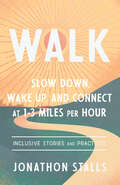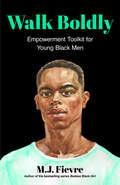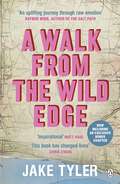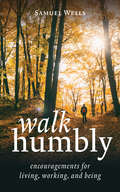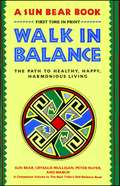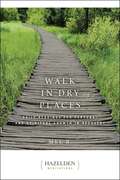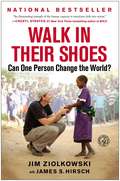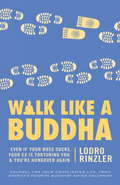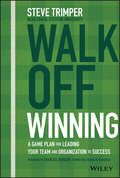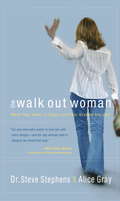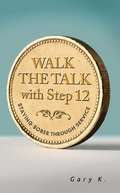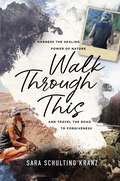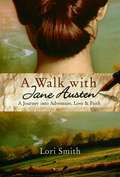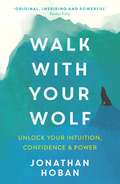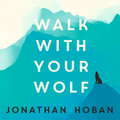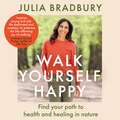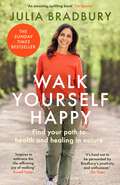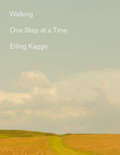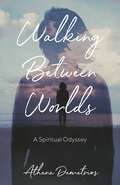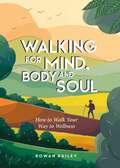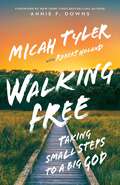- Table View
- List View
WALK: Slow Down, Wake Up, and Connect at 1-3 Miles per Hour
by Jonathon StallsA transformative collection of essays on the power of walking to connect with ourselves, each other, and nature itself.In 2010, Jonathon Stalls and his blue-heeler husky mix began their 242-day walk across the United States, depending upon each other and the kindness of strangers along the way. In this collection of essays, Stalls explores walking as waking up: how a cross-country journey through the family farms of West Virginia, the deep freedom of Nevada&’s High desert, and everywhere in between unlocked connections to his deepest aches and dreams--and opened new avenues for renewal, connection, and change.While most of us won&’t walk or roll across the country, the deep wisdom and insights that Stalls receives from the people, land, and animals he meets on his pilgrimage have profound impacts for each of us. He shares how walking deepened his relationship to himself as a gay man, offering deep and clarifying emotional medicine. He confronts the systemic racism, classism, and ableism that shape and reshape the communities he walks through. And he invites readers to become awakened activists, to begin healing our culture&’s profound separation from the natural world.WALK is for those who crave to feel and embody, not just know and study, their way through complex themes that live in each chapter: vulnerability, human dignity, presence, mystery, and resistance. With dedicated practices--like connecting to Earth stewardship, moving into vulnerability, and walking and rolling with intention--Stalls&’ WALK is an urgent and glorious call to slow down, look around, and engage with the world in front of us. It awakens us to what we miss when we&’re driving by, flying over, and rushing past what surrounds us. It&’s an invitation to move, to connect, to participate deeply in the world--and to dissolve the barriers that disconnect us from each other and the living Earth.
Walk Boldly: Empowerment Toolkit for Young Black Men
by M. J. FievreEmbrace Who You Are as a Male Black Teen#1 New Release in Teen & Young Adult Language Arts BooksEmbrace the color of your skin and celebrate your identity. Finding the courage to live freely and authentically is not easy. This black teen book is designed to help you facilitate your creative drive, promote positive self-awareness, and boost your inner strength.Affirmations for Black teen boys. This black teen book is full of wisdom from Black male trailblazers who accomplished remarkable things in sports, literature, entertainment, education, STEM, business, military and government services, politics and law, activism, and more.Explore the many facets of your identity through hundreds of big and small questions. In this guidebook for teens, M.J. Fievre, educator and author of Raising Confident Black Kids and Badass Black Girl, tackles a variety of relevant topics, such as family and friends, school and careers, and stereotypes. While reflecting on these subjects, you confront the issues that could hold you back from living a confident life as a Black teen boy.Learn from the lives of thriving black men. Alongside space for personal work and reflection, M.J. Fievre provides interviews with successful black men in a variety of fields, including Andrew Bernard of Make It Dairy Free, Justin Black of Redefining Normal, and Roderick “Rod” Morrow of Rodimus Prime.Walk Boldly helps you to:Build and boost your self-esteem with powerful affirmations and stories from Black male role modelsLearn more about yourself through insightful journalingBecome comfortable and confident in your skinIf you enjoyed Black teen books like Uncomfortable Conversations With a Black Boy, 31-Day Affirmations for African American Boys, or Letters to a Young Brother, you’ll love Walk Boldly.
A Walk from the Wild Edge: ‘This Book Has Changed Lives’ Chris Evans
by Jake TylerThe remarkable true story of one man's inspiring journey through his 3,000 mile walk across the country'A great and inspirational read' MATT HAIG, bestselling author of Reasons to Stay Alive'Inspiring' INDEPENDENT'An uplifting and inspirational journey through raw emotion' RAYNOR WINN, bestselling author of The Salt PathAS SEEN ON BBC BREAKFAST______Jake Tyler had forgotten how to feel alive.With only a pair of boots and a backpack, he set off on a 3000-mile walk around Britain - along coastal paths, over mountains, through every national park.His journey became his road to recovery. On it he rediscovered the British landscape, the extraordinary kindness of strangers and most importantly, his place in the world.This is his inspiring story, away from the wild edge.______'Jake you have changed people's lives . . . we are all fans!' Chris Evans, Virgin Radio'An incredible journey, an inspirational memoir . . . beautiful' Zoe Ball, BBC Radio 2'Inspiring . . . It's something that will help many through these dark times' Bryony Gordon'This book is a tonic. Until we can all get out and explore Britain's beauty for ourselves again, this is the ideal substitute' Mirror'So compelling in his honesty . . . very poignant' Express'A tale told with courageous honesty. There's much to learn here about how reconnecting with nature and trusting others can rekindle the joy of being alive' BBC Countryfile 'A testament to the power of human connection, this is a physical and mental journey to inspire hope even in the darkest of times' National Geographic
Walk Humbly: Encouragements for Living, Working, and Being
by Samuel WellsMax Ehrmann&’s prose poem &“Desiderata,&” with its direct instructions —&“go placidly,&” &“enjoy your achievements,&” and others— has inspired millions of readers.In the spirit of Ehrmann&’s &“Desiderata,&” world-renowned ethicist, theologian, and preacher Samuel Wells offers eight encouragements to readers in Walk Humbly, his own more extended prose poem. Each simple, direct exhortation—be humble, be grateful, be your own size, be gentle, be a person of praise, be faithful, be one body, be a blessing—is accompanied by thought-provoking, insightful comments.Drawing on startlingly perceptive observations of contemporary life and reflecting a deep knowledge of philosophical and religious wisdom, Wells&’s Walk Humbly will inspire readers to stop, reflect, and think deeply about essential existence.
Walk Humbly: Encouragements for Living, Working, and Being
by Samuel WellsMax Ehrmann&’s prose poem &“Desiderata,&” with its direct instructions —&“go placidly,&” &“enjoy your achievements,&” and others— has inspired millions of readers.In the spirit of Ehrmann&’s &“Desiderata,&” world-renowned ethicist, theologian, and preacher Samuel Wells offers eight encouragements to readers in Walk Humbly, his own more extended prose poem. Each simple, direct exhortation—be humble, be grateful, be your own size, be gentle, be a person of praise, be faithful, be one body, be a blessing—is accompanied by thought-provoking, insightful comments.Drawing on startlingly perceptive observations of contemporary life and reflecting a deep knowledge of philosophical and religious wisdom, Wells&’s Walk Humbly will inspire readers to stop, reflect, and think deeply about essential existence.
Walk in Balance: The Path to Healthy, Happy, Harmonious Living
by Sun Bear Wabun WindA personal survival manual for attaining the path of inner and outer harmony.Chippewa medicine man Sun Bear now offers a personal survival manual for attaining the path of inner and outer harmony. Sage and empowering guidance on creating and maintaining personal health and happiness can create a holistic pathway to personal affirmation, enrichment, and health.
Walk in Dry Places (Hazelden Meditations #1)
by Mel B.Written in a clear and graceful voice that conveys the gentle, no-nonsense attitude of an old-timer, Walk in Dry Places refocuses on the basics of Twelve Step recovery.For many people involved in Twelve Step recovery, there is always a need for the basics. Walk in Dry Places provides this solid insight and support. Written in the classic style of early meditation books, Walk in Dry Places refocuses on the basics of Twelve Step recovery. The meditations are written in a clear and graceful voice and convey the gentle, no-nonsense attitude of an old timer. Each page contains a daily recovery topic along with an insightful exploration of the day's topic and a one sentence "Goal for the Day." Full of basic AA meeting philosophy, Walk in Dry Places offers daily support to anyone seeking help in staying sober one day at a time.
Walk in Their Shoes: Can One Person Change the World?
by James S. Hirsch Jim ZiolkowskiJim Ziolkowski gave up his career in corporate finance to create buildOn, a service-oriented program that goes into high-risk areas around the world to work with students in their communities. Under Jim's leadership, buildOn volunteers have contributed more than 850,000 hours of community service, and the organization has constructed more than 430 schools worldwide, from the South Bronx, to Detroit, Chicago, and Oakland, to Haiti, Senegal, Nicaragua, and Nepal.Walk in Their Shoes is packed with the ingredients of a powerful bestseller as it traces Jim's story from his transformation from a thrill-seeking twenty-something backpacker, to a Harlem-based idealist trying to launch a not-for-profit organization, and finally to the head of buildOn.Ziolkowski compellingly chronicles his exciting story of worldwide travel and adventure, creating a moving portrait of the power of faith, teamwork, and the boundless potential of the human spirit. Blessed with relentless optimism and an unshakable faith, both of which have fortified his commitment to the poor and the underprivileged, Jim Ziolkowski's inspirational memoir reveals that helping and empathizing with others can help--and heal--ourselves.
Walk in Their Shoes
by James S Hirsch Jim ZiolkowskiThe powerful, personal story of Jim Ziolkowski, the man behind the organization buildOn--which turns inner city teens into community leaders at home and abroad--and his inspiring mission to change the world one community at a time.Jim Ziolkowski gave up his career in corporate finance to create buildOn, a service-oriented program that goes into high-risk areas around the world to work with students in their communities. Under Jim's leadership, buildOn volunteers have contributed more than 850,000 hours of community service, and the organization has constructed more than 430 schools worldwide, from the South Bronx, to Detroit, Chicago, and Oakland, to Haiti, Senegal, Nicaragua, and Nepal. Walk in Their Shoes is packed with the ingredients of a powerful bestseller as it traces Jim's story from his transformation from a thrill-seeking twenty-something backpacker, to a Harlem-based idealist trying to launch a not-for-profit organization, and finally to the head of buildOn. Ziolkowski compellingly chronicles his exciting story of worldwide travel and adventure, creating a moving portrait of the power of faith, teamwork, and the boundless potential of the human spirit. Blessed with relentless optimism and an unshakable faith, both of which have fortified his commitment to the poor and the underprivileged, Jim Ziolkowski's inspirational memoir reveals that helping and empathizing with others can help--and heal--ourselves.
Walk Like a Buddha: Even if Your Boss Sucks, Your Ex Is Torturing You, and You're Hungover Again
by Lodro RinzlerHow can I be the person I want to be when I'm stuck in a job I hate? How is it possible to stay present in an era of nearly constant distractions? Can I pick someone up at a bar or club and still call myself spiritual? This nitty-gritty guide to life for the spiritual-but-not-necessarily-religious uses Buddhist teachings to answer those burning questions and a host of others related to going out, relationships, work, and social action. Based on Lodro Rinzler's popular advice columns, Walk Like a Buddha offers wisdom that can be applied to just the sort of dilemmas that tend to arise for anyone making even a modest attempt to walk like a Buddha--that is, to live with honesty, wisdom, and compassion in the face of whatever life surprises you with.
Walk Off Winning: A Game Plan for Leading Your Team and Organization to Success
by Steve TrimperBecome a doer. Motivation and strategies from a top figure in sports leadership There are many books available on the topic of leadership, but none quite like this one. Walk Off Winning: A Game Plan for Leading Your Team and Organization to Success is the work of Steve Trimper—a college baseball coach who shares what he has learned about business through his extensive leadership experience in high-level sports. In addition to reflecting on his own failures and successes, Trimper interviews leadership experts to distill a wealth of wisdom into this valuable book. Inside, you’ll read about the key principles of team building, culture, and organization building. If you are looking for a way to enhance your leadership, whether you lead a team of one or an entire organization, Walk Off Winning is for you. This book will give you the motivation and strategies to “become a doer.” Anyone involved in leadership, sports management, or the general business world will benefit from the inspirational anecdotes and honest advice in this much sought-after guide for leaders of all kinds. Discover the key principles of team building that apply in every organization and setting Gain the motivation you need to stop waiting around for success and “become a doer” Learn from the real-world successes and failures of a top leader in high-level sports Get inspired to take an honest look at your opportunities for leadership growth From the sports field to the business office, good leadership in any arena shares a single, universal foundation. If you want to achieve your dreams, you’ll have to learn to Walk Off Winning.
The Walk Out Woman: When Your Heart Is Empty and Your Dreams Are Lost
by Alice Gray Steve StephensEvery woman longs to be appreciated, respected, and adored, but when her needs aren't met within her marriage, she could be tempted to walk away. As little hurts and disappointments accumulate and her heart hardens, a woman's loneliness and vulnerability take over, and she might find emotional fulfillment elsewhere, perhaps in even a casual encounter with another man. When the marriage enters this realm of real danger, the woman believes it will be less painful to walk away than try to work on it. With heart and wisdom, Dr. Steve Stephens and Alice Gray offer practical advice for how to stop this epidemic of walk-out women. They outline the warning signs of severe marital discontent and share how to reconnect with your spouse, communicate your hurt, and open your heart. If both partners are willing to work at it, any marriage can be saved. Are You Even Thinking About Walking Out? "I'm at the point where I don't think it is worth the effort anymore. " "The only reason I'm staying is because of the children. " "Surely God doesn't want me to be this unhappy. " Every woman longs to be appreciated, valued, and cared for. When these needs go unmet, she may be tempted to leave the husband she once loved-but walking out is seldom the path to happiness. Like trusted friends, Dr. Steve Stephens and Alice Gray offer wise and gentle advice to restore hope to your marriage. You'll discover proven methods for how you can move toward each other rather than away, build up instead of tear down, and find love rather than lose it. Story Behind the Book Although a growing number of women are walking away from their marriages, there are no books to help them realize that this is not the path to happiness. A woman's discontentment settles like dust on furniture, and although she tries, she fails to make her husband understand. His responses seem too little and too late. Many women mistakenly believe it is easier emotionally to leave the marriage than try to restore it. We want a woman to realize that even when her heart seems closed to her husband, there is a way to open it and become one again. Loss of love does not equal loss of marriage. Loss of hope does not mean the relationship should be abandoned. From the Trade Paperback edition.
Walk the Talk with Step 12: Staying Sober Through Service
by Gary K.Being of service is essential to staying sober and can add a new level of perspective and gratitude to your life. Learn about the power of Step 12 and how to weave service into your day-to-day.“Nothing will so much insure immunity from drinking as intensive work with other alcoholics. It works when other activities fail. This is our twelfth suggestion: Carry this message to other alcoholics! You can help when no one else can. You can secure their confidence when others fail.”—Alcoholics AnonymousThe culmination of all of the steps, Step 12 calls on each of us to complete our transformation from a self-centered existence fueled by addiction to one of joy and freedom through service to others. In Walk the Talk with Step 12 Gary K. explores the the history of Step 12 and redefines what it means to practice this critical step in modern times. Through inspiring testimonials, including the author’s own dramatic story as a survivor of 9/11, we learn how a life of service extends far beyond helping other alcoholics and addicts, and reveals the power of such practices as honesty, tolerance, and love in stabilizing and supporting long term recovery.With passion and insight, Gary K. incites each of us—sponsors and sponsees, newcomers and old timers alike—to define our own paths of service and experience the rewards of community and connection.
Walk Through This: Harness the Healing Power of Nature and Travel the Road to Forgiveness
by Sara Schulting KranzHit the trail with Sara Schulting Kranz, life coach and certified wilderness guide, as she shares her story of forgiveness and healing, and provides a path forward for those who have suffered setbacks or trauma.In Walk Through This: Harness the Healing Power of Nature and Travel the Road to Forgiveness, Sara shares a step-by-step handbook that shows readers how to reconnect with nature--wherever they may be--and begin their healing journey. You&’ll be equipped with tools to use along the way, such asFoundational information about nature deficit disorder and the negative impact it has on our minds and bodiesExercise prompts to help you evaluate where you are on the path and check your progress along the wayMeditations to guide you deeper into the processEveryone has the capacity to forgive and to heal. All you need to do is take that first step . . .
A Walk with Jane Austen: A Journey into Adventure, Love, and Faith
by Lori SmithAt thirty-three, Lori Smith found herself falling short of her expectations: single, facing a difficult job, and sinking fast into something like depression. She needed a change. So, instead of waiting for her Darcy to present himself, she makes the long-awaited leap, leaving her job and country to travel through Jane Austen's England. On an adventure of multi-layered discovery, Lori leads readers through Jane's life and the landscapes she knew and loved - from Oxford to Bath, to London and the Hampshire countryside - and through her own emotional landscapes, in which grace and hope take the place of stagnation and despair. Along the way, we explore the small things and the great things, both meanness and goodness in relationships, to discover what Austen herself knew: the joy of life, however ordinary or unexpected.
Walk With Your Wolf: Unlock your intuition, confidence & power with walking therapy
by Jonathan Hoban'Drawing on perceptive insight and profound wisdom, Jonathan Hoban reveals how the simple act of walking can displace our minds from a place of chaos to tranquil calm, and makes a beautiful and inspiring case for walking with your wolf.' - Dr Mithu Storoni, author of Stress-ProofNature is our greatest healer. It's time to start walking and reclaim the wildness in all of us.When did you last take a walk? Not a stroll to the shops, or to the pub, but a walk that got you energised, stimulated your senses, allowing you to de-stress? If the answer is that you'd love to walk, but don't have the time, there really are more reasons to get outside than you might think.When we walk we find the space to process our feelings and we begin to have the courage to be vulnerable and honest with ourselves. Walking awakens the intuition that helps us face up to our difficulties and walk alongside them, enabling us to find positive solutions to our problems. Our ancestors knew all about movement - they walked across the planet, understanding nature and learning to respect and work in harmony with it. Written by a London-based therapist, Walk with your Wolf is part memoir, part self-help and part reflection on the connection we must re-establish with our natural, intuitive selves if we are to live healthy, fulfilling lives. Offering practical advice and exercises on how to walk and think as a method of confronting difficult emotions, this book will allow you to reconnect with your intuition, confidence and power.'An important message about the power of reconnecting with the primal self to achieve balance in the modern world. A fascinating read' - Megan Hine'Deftly blending science, his own narrative and his experience as a therapist, he is at our side as we find a way of engaging with and being healed by nature. Like the wolf in the book's title, we can reconnect with our own elemental lupine instincts which are so often repressed in our stressful and artificial world - both a wolf's wildness as well as its sociability and need to be part of a pack. Follow in Hoban's easy to apply footsteps and you will never walk alone again. - Rachel Kelly, bestselling author of Walking on Sunshine and The Happy Kitchen'Jonathan Hoban challenges us to use nature as a setting for reconsidering our lives and our stresses. He asks us to 'walk alongside our difficulties' giving ourselves the physical and mental space to look at ourselves anew and to decide what we really need. For that commute to work, or indeed for that break on the park bench, I commend this book.' - Sir Ciarán Devane, CEO of the British Council
Walk With Your Wolf: Unlock your intuition, confidence & power with walking therapy
by Jonathan HobanNature is our greatest healer. It's time to start walking and reclaim the wildness in all of us.Walking is a way to get you to listen to yourself openly and honestly, without all the noise that our endless inner critic inflicts upon us.When did you last take a walk? Not a stroll to the shops, or to the pub, but a walk that got you energised, stimulated your senses, allowing you to de-stress? If the answer is that you'd love to walk, but don't have the time, there really are more reasons to get outside than you might think.When we walk we find the space to process our feelings and we begin to have the courage to be vulnerable and honest with ourselves. Walking awakens the intuition that helps us face up to our difficulties and walk alongside them, enabling us to find positive solutions to our problems. Our ancestors knew all about movement - they walked across the planet, understanding nature and learning to respect and work in harmony with it. Written by a London-based therapist, Walk with your Wolf is part memoir, part self-help and part reflection on the connection we must re-establish with our natural, intuitive selves if we are to live healthy, fulfilling lives. Offering practical advice and exercises on how to walk and think as a method of confronting difficult emotions, this book will allow you to reconnect with your intuition, confidence and power.(P)2019 Hodder & Stoughton Ltd
Walk Yourself Happy: Find your path to health and healing in nature
by Julia BradburyTHE SUNDAY TIMES BESTSELLER'It's hard not to be persuaded by Bradbury's enthusiasm and positivity' THE TIMESJoin Julia Bradbury as she leads you through the walk of our lifetimes. There's a lot of talk about how we all must connect more with nature. But what does that mean? How do you do it? And what does it do for you in return? Can something as simple as going for a walk really improve your life? The simple answer is: YES. Walk Yourself Happy will explain the elemental link between our own health - both physical and mental - and the natural world. Julia knows first-hand the profound impact of nature: it has helped her survive breast cancer, overcome infertility and continue through failed IVF treatments; it balances the soul and acts as a confidante and therapist. Through science-backed information, practical tips and Julia's own story, Walk Yourself Happy will explore how nature can soothe anxiety and stress, how a mountain or a tree can keep you company in times of grief, and the importance of building nature into your everyday life, so you eat well, sleep better and move more.Walking, one of the most accessible activities for most of us, is the fastest and easiest way to embed yourself in nature. You don't need expertise or equipment; you just need to put one foot in front of another. You don't need an epic landscape either, you can walk down the street or in your local green space. Though, as you will learn from this book, a walk in the park is rarely just that. We all have shocks and surprises that stop us in our tracks, make us question who we are and why we are here. In walking, we have the power to change our pace. And when we do that, we can find union with nature, camaraderie with friends and a form of intimacy with self. We can walk ourselves happy and we can walk ourselves healthy, and we can rekindle the innate bonds, all-but extinguished by modern living, that we have always had to our natural environment. We can start today.
Walk Yourself Happy: Find your path to health and healing in nature
by Julia Bradbury'It's hard not to be persuaded by Bradbury's enthusiasm and positivity' THE TIMESJoin Julia Bradbury as she leads you through the walk of our lifetimes. There's a lot of talk about how we all must connect more with nature. But what does that mean? How do you do it? And what does it do for you in return? Can something as simple as going for a walk really improve your life? The simple answer is: YES. Walk Yourself Happy will explain the elemental link between our own health - both physical and mental - and the natural world. Julia knows first-hand the profound impact of nature: it has helped her survive breast cancer, overcome infertility and continue through failed IVF treatments; it balances the soul and acts as a confidante and therapist. Through science-backed information, practical tips and Julia's own story, Walk Yourself Happy will explore how nature can soothe anxiety and stress, how a mountain or a tree can keep you company in times of grief, and the importance of building nature into your everyday life, so you eat well, sleep better and move more.Walking, one of the most accessible activities for most of us, is the fastest and easiest way to embed yourself in nature. You don't need expertise or equipment; you just need to put one foot in front of another. You don't need an epic landscape either, you can walk down the street or in your local green space. Though, as you will learn from this book, a walk in the park is rarely just that. We all have shocks and surprises that stop us in our tracks, make us question who we are and why we are here. In walking, we have the power to change our pace. And when we do that, we can find union with nature, camaraderie with friends and a form of intimacy with self. We can walk ourselves happy and we can walk ourselves healthy, and we can rekindle the innate bonds, all-but extinguished by modern living, that we have always had to our natural environment. We can start today.
Walking: One Step At a Time
by Erling KaggeA lyrical account of an activity that is essential for our sanity, equilibrium, and well-being, from the author of Silence ("A book to be handled and savored." —The Wall Street Journal)Placing one foot in front of the other, embarking on the journey of discovery, and experiencing the joy of exploration—these activities are intrinsic to our nature. Our ancestors traveled long distances on foot, gaining new experiences and learning from them. But as universal as walking is, each of us will experience it differently. For Erling Kagge, it is the gateway to the questions that fascinate him—Why do we walk? Where do we walk from? What is our destination?—and in this book he invites us to investigate them along with him. Language reflects the idea that life is one single walk; the word "journey" comes from the distance we travel in the course of a day. Walking for Kagge is a natural accompaniment to creativity: the occasion for the unspoken dialogue of thinking. Walking is also the antidote to the speed at which we conduct our lives, to our insistence on rushing, on doing everything in a precipitous manner—walking is among the most radical things we can do.
Walking Between Worlds: A Spiritual Odyssey
by Athena DemetriosAfter growing up in abject poverty in a dysfunctional alcoholic environment and being terrorized by a boarder who lived in the root cellar, Athena Demetrios repressed her traumatic memories—thrusting her into a downward spiral of melancholy and despair. But when, as an adult, she had a powerful spiritual experience that opened doors into other dimensions, she began an odyssey in which truth became stranger than fiction—a journey through hypnotic regression that led her to transcendence and healing. Demetrios&’s story of courage, mystical insight, and otherworldly guidance will open your heart and challenge your perception of the borders of our minds and the boundaries of our world. This is a tale of past-life visions, spiritual guides, and communication beyond death—and emergence into the radiant light of self-discovery, knowing, and being at peace with all that is.
Walking by Faith, Serving in Love: 16 Practices for Growing in the Grace of God
by Jimmy WalkerIn Walking by Faith, Serving in Love, Jimmy Walker provides sixteen practical ways we can grow in our faith and serve others who are in need.Everyone who&’s anyone knows Jimmy Walker. The long list of world-class athletes, actors, musicians, CEOs, and political leaders who sing his praises all say variations of the same thing: He&’s among the most enthusiastic, relational, determined, and passionately generous people they&’ve ever met. As much as Jimmy appreciates his friendships with such shining stars, in Walking by Faith, Serving in Love, he shines a spotlight on the brightest star of all—the most important Person he has ever encountered: his Lord and Savior, Jesus Christ. And while these pages include a bevy of behind-the-scenes anecdotes featuring celebrities Jimmy has known during decades as a business leader and charity influencer, center stage belongs to the God whose love, grace, and mercy continue to sustain and guide him. As Jimmy unfolds the highs and lows of his faith journey, you&’ll be inspired by: his reluctant six-week commitment that grew into a lifelong spiritual adventure the depth of peace and purpose he has experienced by walking with God the divine comfort and strength he and his wife, Nancy, relied on as they endured an unspeakably tragic loss his wisdom-laden perspective on the essential ingredient in true &“greatness&” . . . and much more. Get ready to be both entertained and deeply moved, and most of all to receive a life-affirming dose of encouragement, as Jimmy winsomely shares his faith in Christ and its profound impact on his momentous and memorable life.
Walking for Mind, Body and Soul: How to Walk Your Way to Wellness
by Rowan BaileyGuiding you through the physical, spiritual and sensory benefits of walking, these pages will help you reap the therapeutic wonders of putting one foot in front of the other. Bursting with practical tips, insightful information and inspirational ideas, this book is your companion to crafting a life of balance and bliss with every step.
Walking for Mind, Body and Soul: How to Walk Your Way to Wellness
by Rowan BaileyGuiding you through the physical, spiritual and sensory benefits of walking, these pages will help you reap the therapeutic wonders of putting one foot in front of the other. Bursting with practical tips, insightful information and inspirational ideas, this book is your companion to crafting a life of balance and bliss with every step.
Walking Free: Taking Small Steps to a Big God
by Robert Noland Micah TylerRenowned Christian music artist and former youth pastor Micah Tyler helps readers set out on the path to a free and meaningful life in his first book, Walking Free. Inspired by his hit song, Micah Tyler&’s Walking Free: Taking Small Steps to a Big God encourages believers to pursue a deeper relationship with Jesus, regardless of external circumstances. The journey from where we are to where God wants us to be is filled with challenges and obstacles. Walking Free uplifts readers with the truth that God will always walk with us and never leave us behind. Micah applies Scripture and Biblical wisdom in his teaching alongside personal stories which illuminate the path before us. With 45 steps, Walking Free includes questions and personal reflections that will inspire readers to grow in their relationship with God. Walking Free also includes: - A plan for pursuing God like never before - 42 steps covering many of life&’s challenges - Over 120 questions for self-reflection or discussion - Practical guidance for transforming your spiritual life - A glimpse into Micah Tyler&’s life and insights. Walking Free will help you overcome life&’s challenges by taking small steps to experience the mercy and mission of a closer connection with God.
